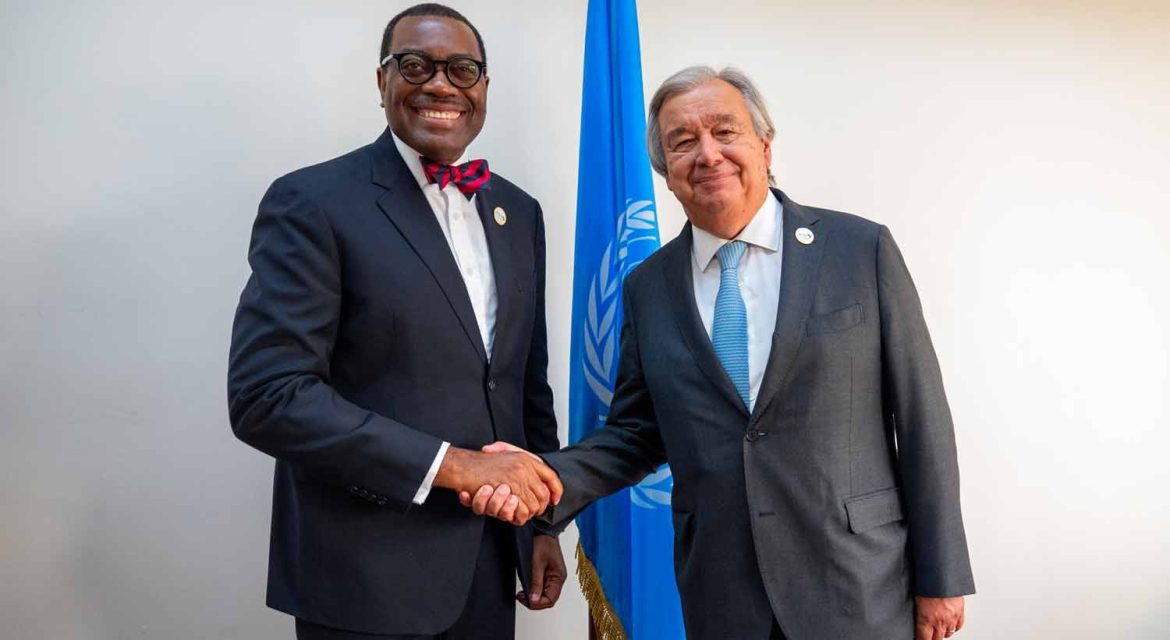The Secretary-General of the United Nations, António Guterres, has praised the President of the African Development Bank (AfDB), Dr. Akinwumi Adesina, for his trailblazing role in reshaping global development finance and his strategic leadership that has directly advanced Africa’s growth and resilience.
In a powerful message delivered during the AfDB’s 2025 Annual Meetings held in Abidjan, Côte d’Ivoire, Guterres described Adesina as a visionary who is redefining how international financial resources are mobilised and distributed, especially for the benefit of vulnerable and developing countries.
Guterres highlighted Dr. Adesina’s pioneering efforts in leveraging the International Monetary Fund’s Special Drawing Rights (SDRs) to tackle the pressing development needs of fragile economies, particularly those hit hardest by overlapping crises such as debt stress, climate shocks, food insecurity, and shrinking fiscal capacity.
“Your advocacy was instrumental in securing the rechanneling of SDRs through multilateral development banks,” Guterres noted, adding that this has made it possible to redirect global liquidity where it is most urgently required. “This innovation has provided a lifeline to countries grappling with unsustainable debt burdens and economic instability.”
He emphasized that Dr. Adesina’s approach marks a transformative moment in the global financial architecture, setting a new model for how multilateral institutions can work to support inclusive and sustainable growth.
The UN Secretary-General also praised Adesina for his strategic implementation of the AfDB’s “High 5s” agenda.
According to Guterres, these five pillars are not only aligned with the United Nations Sustainable Development Goals (SDGs) but also accelerate the ambitions of the African Union’s Agenda 2063, a continental framework aimed at achieving socio-economic transformation.
Since assuming office, Adesina has overseen a tripling of the AfDB’s capital base, enabling the institution to expand its footprint in responding to both immediate and long-term challenges. Guterres noted that this institutional growth helped the Bank respond decisively during the COVID-19 pandemic and is positioning it as a critical player in Africa’s structural transformation and global development partnerships.
He further commended the Bank’s impact in clean energy, climate-resilient agriculture, and green infrastructure, calling these sectors “vital to Africa’s sustainable future and its efforts in adapting to climate change.” The Bank has consistently led investment efforts in renewable energy, supporting several transformative projects across the continent that promote both access and sustainability.
Guterres acknowledged Adesina’s steadfast commitment to equity, justice, and fairness in the global financial system, an area he said has long lacked reform in favour of low-income and emerging economies.
“Your efforts have been instrumental in building a more fair and just financial system for all,” Guterres said, underlining the global importance of Adesina’s work beyond Africa.
The 2025 AfDB Annual Meetings drew international attention, bringing together finance ministers, central bank governors, development experts, and heads of multilateral organisations to review Africa’s development prospects, financing challenges, and opportunities for global collaboration.
Dr. Akinwumi Adesina, who served as Nigeria’s Minister of Agriculture before becoming President of the AfDB in 2015, has become one of Africa’s most influential economic leaders. His focus on innovative financing models, such as the use of blended finance, green bonds, and SDR reallocation, continues to reshape the role of multilateral development banks in achieving the SDGs.
Under his leadership, the Bank has significantly scaled up support for infrastructure, youth entrepreneurship, gender equality, and climate adaptation, contributing to Africa’s resilience in the face of global economic and environmental turbulence.
As the international community seeks to reform the global financial system to better serve developing countries, Guterres’ recognition of Adesina’s work places the AfDB and Africa at the centre of those reforms, showing that African institutions and leadership can play a major role in shaping a more equitable global order.
